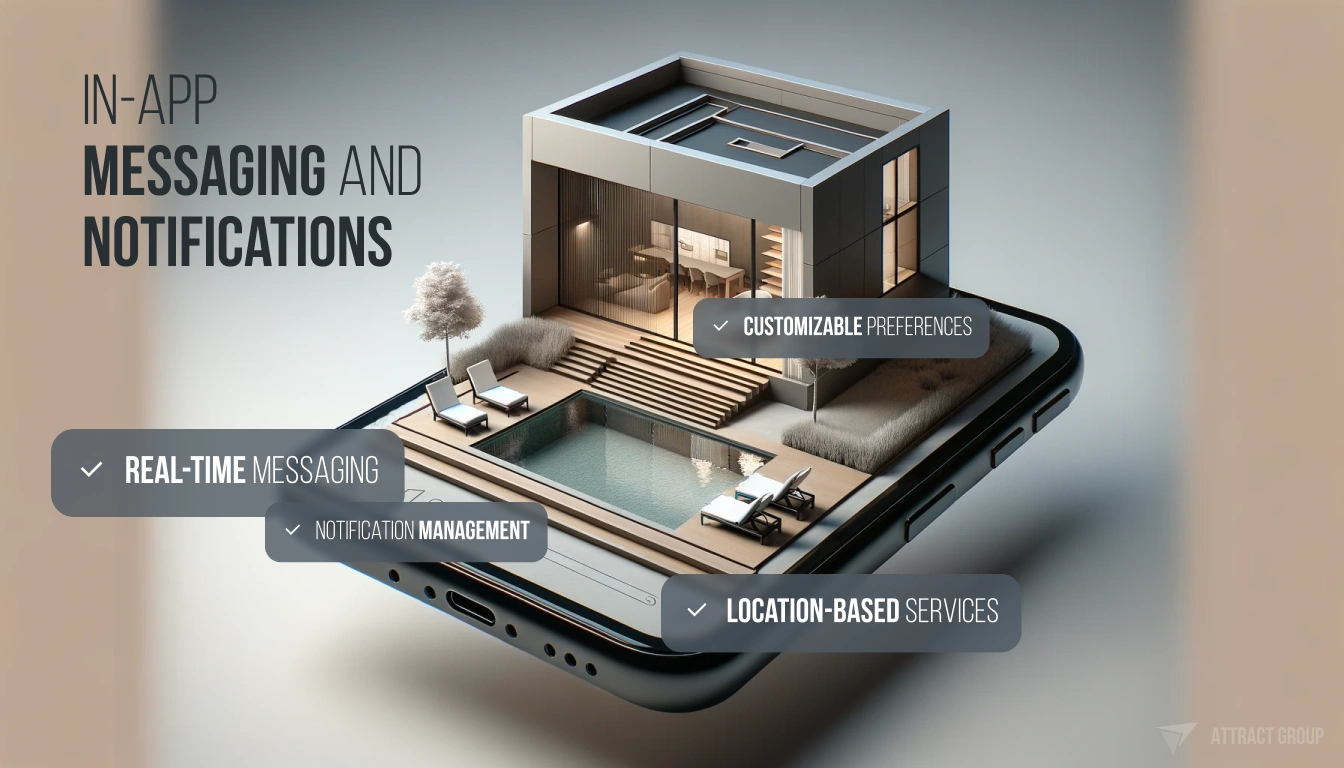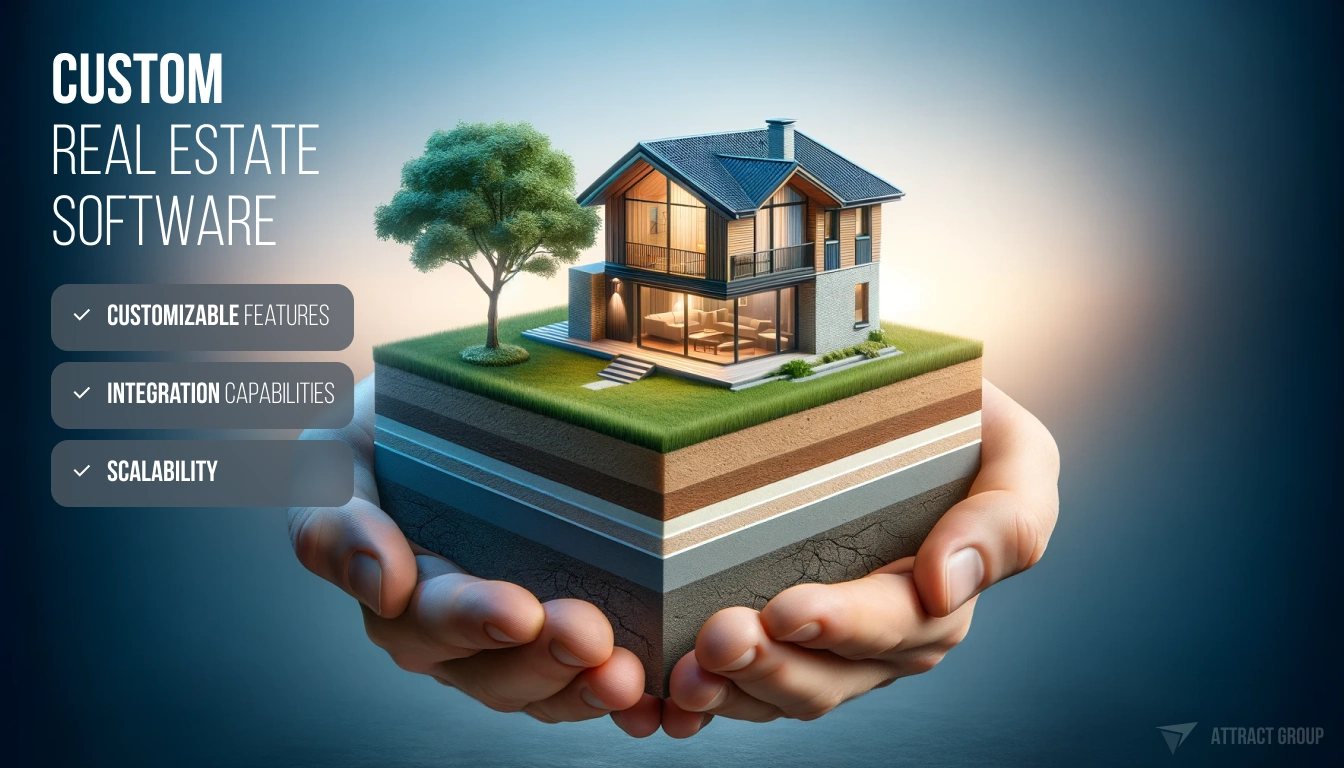Explore Property Management Mobile App Features for Efficient Realty
 28 November 2023
28 November 2023In the fast-paced world of real estate, staying ahead of the competition and effectively managing properties requires innovative solutions. Property management mobile app features offer property owners and managers the efficiency and convenience needed to streamline realty tasks. With advanced real estate management software development, such as property listings, tenant management, financial tracking, and secure communication channels, property management professionals can substantially enhance their operational prowess and stay competitive in the rapidly evolving market.
Key Takeaways
- Property management mobile app features are instrumental in streamlining real estate tasks and staying competitive.
- Innovative technology enhances property listings, tenant relationship management, financial tracking, and communication.
- Real estate management software development enables property managers to handle complex tasks with greater efficiency.
- Customizable and scalable tools cater to diverse real estate portfolios, adapting to both small and large properties.
- Adopting cutting-edge mobile app features reinforces growth potential and creates a competitive advantage in the market.
Revolutionizing Property Listings with Mobile Technology
Mobile technology plays an increasingly pivotal role in modern real estate, transforming the way properties are listed and viewed. The integration of advanced features such as virtual tours, high-quality photos, and detailed property descriptions, alongside mobile app development, is revolutionizing the industry. By optimizing property listings for mobile users, potential tenants and buyers can explore properties anytime, anywhere, leading to a faster sales process and a more engaging customer experience.

Real estate mobile app development provides extensive benefits for both property managers and consumers. For the latter, advanced search functionalities featured in many property management mobile apps enable users to find suitable properties with greater ease. In turn, this greatly streamlines the process of listing and searching properties while catering to the growing trend of consumers relying on mobile devices for their real estate inquiries.
Real estate mobile app development allows businesses to improve property listings and streamline the process of listing and searching properties.
Mobile technology in realty has given rise to a multitude of innovations, such as:
- Virtual tours, which enable potential tenants and buyers to visit a property remotely in a fully immersive, 3D environment.
- Advanced search filters that allow users to find properties that meet specific criteria such as location, price, and amenities, making the search process more efficient.
- Detailed property pages, complete with photos, floor plans, and comprehensive descriptions, provide a wealth of information for prospective buyers and tenants.
By implementing these features and embracing mobile app development, property managers can attract more potential buyers and tenants and foster a more engaging customer experience.
| Feature | Benefit for Property Managers | Benefit for Consumers |
|---|---|---|
| Virtual Tours | Can showcase properties more effectively, increasing appeal | Experience properties firsthand without need for physical visit |
| Advanced Search Filters | Attract more targeted leads, increasing listings’ exposure | Efficiently find properties that fit their needs and preferences |
| Detailed Property Pages | Convey comprehensive property information, building trust with prospects | Get a better sense of the property without in-person visits |
Mobile technology in realty is transforming the way property listings are managed and accessed. By adopting advanced features and embracing mobile app development, businesses can significantly enhance their real estate services, catering to the preferences of today’s tech-savvy consumers. This, in turn, leads to a more efficient and engaging experience for property managers, potential tenants, and buyers alike.
The Role of Tenant Apps in Enhancing Rental Experiences
Tenant apps play a crucial role in streamlining rental experiences, offering a central hub for efficient communication and multi-faceted management functions. Developing a mobile app for property management comes with a myriad of benefits, from simplified in-app communication to an integrated financial management software. The addition of tenant feedback integration further empowers property management software to adapt and improve continually.

Seamless Tenant Communication and Issue Reporting
In-app communication features, like real-time messaging and notifications, greatly enhance the responsiveness of property management processes. A centralized system for issue reporting enables tenants to swiftly notify property managers of any concerns, fostering transparency and promoting prompt resolutions. Allowing tenants to access this all-in-one system ensures they can reach property managers more efficiently than traditional methods such as phone calls or emails.
Automated Rent Payment Systems
One major benefit of tenant apps is the ability to automate rent payments, benefitting both property managers and tenants alike. Utilizing secure, mobile-optimized payment gateways, these innovations ensure timely rent collection while minimizing human error. Automated tenant apps send out reminder notifications, keep accurate transaction records, and maintain clear rent schedules, contributing to a streamlined financial management process.
“Tenant apps greatly enhance rental experiences by providing platforms for timely and efficient communication between tenants and property managers.”
Integrating Tenant Feedback for Continuous Improvement
Tenant feedback is a transformative resource for property management, enabling continuous improvement and stronger tenant relationships. Mobile app solutions that include options for ratings and comments facilitate an open line of communication, allowing property managers to listen, assess, and improve their services based on direct user feedback. By fostering this level of engagement and understanding, mobile app for property management systems evolve and shape to cater to the real needs of tenants and managers alike.
- Seamless Tenant Communication and Issue Reporting
- Automated Rent Payment Systems
- Integrating Tenant Feedback for Continuous Improvement
| Mobile Property Management Features | Benefits for Tenants | Benefits for Property Managers |
|---|---|---|
| In-app Communication | Faster communication and issue resolution | Efficient and organized message handling |
| Automated Rent Payment | Convenient and timely rent transactions | Consistent rent collection and reduced errors |
| Tenant Feedback Integration | Higher satisfaction through improved service | Continuous improvement and better tenant relations |
Maintenance Coordination at Your Fingertips
Technology has simplified numerous tasks that once demanded strenuous manual labor. One such area is property maintenance, where the introduction of property management mobile apps has revolutionized the way property managers and landlords coordinate maintenance tasks. Mobile devices now facilitate efficient maintenance coordination, thanks to user-friendly property maintenance apps.
A mobile app for property management provides an accessible platform for scheduling repairs, tracking tenant maintenance requests, and assuring timely property upkeep. These advancements contribute significantly to an improved work process and, ultimately, happier tenants due to quicker resolution of maintenance issues.
“The property maintenance app has made it easy for me to manage multiple properties and handle maintenance requests. My tenants appreciate the prompt responses and smooth process.”
Below are some key benefits of integrating a maintenance coordination tool into your property management operations:
- Easy submission and tracking of maintenance requests
- Real-time updates on the status of repairs
- Seamless communication between property managers, tenants, and service providers
- Automated record-keeping of past maintenance and repairs
- Improved resource allocation and task prioritization
Fine-tuning your property maintenance workflow is essential for boosting overall satisfaction and retaining tenants. With a mobile app for property management that includes maintenance coordination features, all parties involved can enjoy streamlined processes and contribute to well-maintained properties.
Optimizing Financial Management for Property Owners
Financial management is a crucial aspect of property management, especially for property owners who want to keep a tight rein on expenses, maintain profitability, and optimize their real estate investments. Property management financial software offers a variety of powerful tools and features that address these critical areas.
Simplifying Expense Tracking and Budgeting
A reliable expense tracking app can simplify expense tracking and budgeting for property owners. These apps enable users to record, categorize, and analyze expenses in real-time, helping improve financial control and transparency. Some of the benefits of using a property management budgeting software include:
- Ease of tracking and categorizing expenses
- Automatic calculation of tax deductions
- Real-time budget analysis and forecasting
- Instant notification for rent payments and expenses
By employing an expense tracking app as part of a comprehensive property management financial software suite, property owners can streamline their financial processes and spend more time focusing on their core business tasks.
Generating Real-Time Financial Reporting
One of the key features that property management tools should offer is the ability to generate real-time financial reports. These reports can provide valuable insights into financial performance, income, expenses, and other key financial metrics that can help property managers and owners make informed decisions. Some examples of financial reports provided by a property management financial software include:
- Revenue and expense summary
- Profit and loss statement
- Balance sheet
- Budget variance
- Tax reports
These detailed reports can help property owners identify trends, compare actual results to budgeted figures, uncover inefficiencies, and make necessary adjustments to maintain and improve their property’s profitability.

Optimizing financial management for property owners requires investment in powerful property management tools that can simplify expense tracking, budgeting, and generate real-time financial reports. By leveraging these tools, property owners can make critical decisions with confidence, while maintaining full control over their real estate investments.
Empowering Realty with Mobile App Dashboards and Analytics
Mobile app dashboards and analytics play a crucial role in empowering realty operations, providing users with an overview of property performance metrics and trends. Through advanced analytics, property owners and managers can monitor key performance indicators (KPIs), analyze tenant behaviors, and utilize data-driven insights to optimize their real estate portfolios.
One of the many powerful property management app features is the integration of mobile app dashboards, designed to provide users with a comprehensive view of their real estate portfolio performance. With intuitive interface layouts, users can effortlessly navigate through various sections, visualizing crucial information such as occupancy rates, rent collection progress, and maintenance issue resolutions. These dashboards transform raw data into easily interpretable charts and graphs, enabling property managers to make quick, informed decisions.
In addition, real estate analytics equip property management apps with the ability to track and measure KPIs, which can vary based on specific property management goals. Some possible KPIs include tenant retention rates, average vacancy periods, and rental revenue growth. Employing data analytics tools, users can analyze data trends, enabling them to detect potential problem areas and take corrective actions to enhance property performance.
Analytics open doors for in-depth industry insights and meaningful decision-making, helping property managers stay ahead of the competition and capitalize on growth opportunities.
Moreover, analyzing tenant behaviors and preferences plays a pivotal role in optimizing real estate investments. Data collected from the mobile app, such as popular search filters or frequently visited listings, can be utilized to identify tenant needs and preferences. By gaining insights into tenant behavior patterns, property managers can make strategic adjustments to their properties, amenities, and pricing, aligning them with tenant expectations and maximizing profitability.
| Key Performance Indicator (KPI) | Description |
|---|---|
| Tenant Retention Rate | Measures the ability of a property manager to retain tenants over a given period. |
| Average Vacancy Period | Represents the average time that units remain vacant before being rented. |
| Rental Revenue Growth | Indicates the increase in rental income over time, accounting for factors such as rent adjustments and property portfolio expansion. |
Leveraging the power of mobile app dashboards and real estate analytics empowers property owners and managers to make data-driven decisions, ultimately maximizing the potential of their real estate portfolios. Incorporating these property management app features ensures a more efficient, profitable, and competitive approach to managing properties in today’s fast-paced real estate market.
Enhancing Security Features in Property Management Software
Ensuring the safety and confidentiality of sensitive data is crucial in the world of property management. With the increasing adoption of mobile apps for managing properties, it is of utmost importance to integrate stringent security measures that protect tenant and property data against potential breaches. This section focuses on how modern encryption technology significantly enhances data protection in property management software.
Protecting Sensitive Data with Modern Encryption
Incorporating robust encryption methods is essential to safeguard the sensitive information stored and transmitted within property management software. Encryption involves encoding data into a format that can only be accessed by authorized individuals possessing a decryption key. This technique prevents unauthorized intrusion, thereby maintaining the privacy of sensitive information such as tenant details, financial transactions, and property records.

Various encryption standards are utilized to provide maximum data protection. Advanced Encryption Standard (AES) and RSA are two widely adopted algorithms that ensure the confidentiality and integrity of data. These algorithms safeguard information both during transmission and while stored in databases:
- AES encryption employs symmetric keys to encode and decode data, providing fast and secure data encryption with key sizes of 128, 192, or 256 bits.
- RSA encryption, a public-key cryptosystem, allows for secure data exchange between parties without the need to share a common encryption key. Employing larger key sizes enhances the security offered by RSA algorithms.
“Modern encryption technology is vital to protect sensitive information in property management software, fortifying data security and ensuring adherence to the strictest privacy regulations.”
It is also essential for property management software to comply with data protection regulations such as the General Data Protection Regulation (GDPR) and the California Consumer Privacy Act (CCPA). Compliance with these laws ensures the proper handling of personal data and fosters trust with tenants and property owners.
To further bolster security, multifactor authentication (MFA) mechanisms can be implemented to verify the identity of users trying to access the property management system. In addition to traditional username and password credentials, MFA requires users to provide an additional form of identification, such as a fingerprint or authentication code sent to a mobile device.
Regularly updating software components is another essential security measure. Ensuring that the property management app is always up to date with the latest security patches and updates can help prevent cyberattacks stemming from unpatched vulnerabilities.
Investing in property management software with robust security features such as modern encryption technology, MFA, and compliance with data protection regulations is critical for the safe handling of sensitive information. By doing so, property managers can ease the minds of both tenants and property owners, knowing that their data is well-protected against potential threats.
Supercharging Communication with In-App Messaging and Notifications
Effective mobile communication in property management is crucial to fostering positive relationships between property managers, tenants, and service providers. With the integration of in-app messaging and property management notifications, communication within the industry becomes more instant and direct, ensuring that the flow of information remains seamless and efficient.
“In-app messaging and notifications enable prompt communication among property managers, tenants, and service providers, thus streamlining the overall information flow.”
Below are some essential features and benefits of in-app messaging and notifications in property management:
- Real-time messaging: Immediate communication between property managers, tenants, and service providers is facilitated, allowing for prompt responses and improvements to any issues that may arise.
- Notification management: Automated notifications and reminders about rent payments, maintenance updates, or events can be sent directly to relevant parties, ensuring that everyone stays informed and engaged.
- Customizable preferences: Users can tailor their notification settings to receive only relevant and necessary alerts, reducing unnecessary distractions and enhancing overall user experience.
- Location-based services: Integrating geolocation functionality allows property managers to provide targeted information on amenities, neighborhood updates, and safety alerts for a better tenant experience.
Using these key features in property management apps substantially improves communication and collaboration, ultimately leading to better property management and tenant relationships. In-app messaging and notifications help create an ecosystem for efficient information exchange, increasing responsiveness and overall satisfaction.

| Feature | Function | Benefit |
|---|---|---|
| Real-time messaging | Facilitates instant communication | Allows for prompt responses and improvements |
| Notification management | Sends automated notifications and reminders | Keeps everyone informed and engaged |
| Customizable preferences | Tailors notification settings | Reduces distractions and enhances user experience |
| Location-based services | Integrates geolocation functionality | Provides targeted information for better tenant experience |
Why Mobile Apps are a Game Changer for Landlord Operations
Landlord apps are revolutionizing property management efficiency. Innovative app features, such as automated work order systems, document management, and electronic signatures, greatly improve landlord operations by reducing manual workload and enhancing overall efficiency. This enables property managers to be agile and effective in managing their real estate assets.
Innovative Features for Property Management Efficiency
Landlord apps come with an array of innovative features that streamline property management processes and tasks, contributing to a more efficient and hassle-free experience for both landlords and tenants. Some noteworthy features of these apps include:
- Automated work order systems
- Document management
- Electronic signatures
- Tenant communication
- Rent collection and invoicing
- Property maintenance management
- Analytics and reporting
“The automation capabilities of a landlord app significantly reduce the amount of manual labor required to manage properties, leading to substantial improvements in property management efficiency.”
These innovative features help landlords maintain an organized and systematic approach to property management, ensuring seamless interactions and transactions with tenants. By leveraging the power of mobile apps in property management, landlords can better allocate their time and resources to other important aspects of their businesses, such as expanding their property portfolios and enhancing tenant satisfaction.
| Feature | Description |
|---|---|
| Automated work order systems | Streamlines the process of scheduling and assigning work orders, including maintenance and repairs. |
| Document management | Organizes and stores relevant documents, contracts, and forms in a centralized location, allowing for easy access and retrieval. |
| Electronic signatures | Facilitates the electronic signing of documents, making the process more efficient and environmentally friendly. |
| Tenant communication | Provides a platform for instantaneous communication between landlords and tenants, ensuring timely responses to inquiries and requests. |
| Rent collection and invoicing | Automates the process of rent collection and invoicing, resulting in timely payments and improved cash flow management. |
| Property maintenance management | Coordinates and tracks property maintenance tasks, ensuring properties remain in optimal condition. |
| Analytics and reporting | Offers valuable insights and data analysis, enabling landlords to make informed decisions about their properties and investments. |
As the real estate landscape continues to embrace digitalization, adopting landlord apps for property management will lead to increased efficiency, better organization, and improved tenant satisfaction. By harnessing the power of these innovative features, landlords can effectively manage their properties while staying ahead of the competition.
Adapting Property Management Tools for Diverse Real Estate Portfolios
Managing diverse real estate portfolios requires adaptive property management tools to cater to the distinct needs of different types of properties effectively and efficiently. Whether it is a single-unit rental, a commercial estate, or large multifamily complexes, property managers and owners must be capable of addressing the unique challenges they present. By embracing and implementing custom real estate software, businesses can optimize their operations and ensure a competitive edge in a dynamic market.
Adaptive property management tools need to have customizable features, integration capabilities, and scalability. This versatility empowers real estate professionals to adapt to the evolving landscape and stay ahead of the curve.
- Customizable Features: Real estate software customization allows businesses to select and incorporate features that are most relevant to their specific operations. For instance, a commercial property manager might prioritize lease management tools or invoicing systems, while a residential property manager might place higher importance on tenant communication and maintenance scheduling apps.
- Integration Capabilities: Real estate professionals rely heavily on multiple tools and software systems to manage their portfolios. Adaptive property management tools should seamlessly integrate with these existing systems, such as third-party marketing platforms, accounting software, and payment gateways, to centralize operations and simplify workflows.
- Scalability: Scalability is crucial when dealing with diverse real estate portfolios. As businesses expand, their property management tools must be able to accommodate growth and increased operational complexity. Scalable solutions ensure that property management applications can adapt to a user’s growing portfolio without sacrificing performance or efficiency.
Adapting property management tools to cater to diverse real estate portfolios not only streamlines operations but also reinforces the potential for growth and competitive advantage. By investing in customizable software with integration capabilities and scalability, real estate professionals can position themselves and their businesses for long-term success.

In the ever-evolving real estate market, the need for adaptive and customizable property management tools has never been greater. Staying ahead of the industry demands and capitalizing on emerging opportunities requires innovative solutions geared towards effectively managing diverse real estate portfolios.
Conclusion
The property management software benefits brought by real estate technology innovations are undeniably changing the landscape of the industry. By leveraging cutting-edge mobile app features, property managers and tenants are better equipped to handle complex challenges associated with modern property management. Embracing the use of these advanced tools not only streamlines operations but also positions property managers for growth and competitive advantage in a dynamic market.
As mobile technology continues to evolve, real estate professionals must stay agile and open to new developments for handling their diverse real estate portfolios. Property management system advantages extend to various sectors within the industry, regardless of size or property type, making its adoption increasingly essential in today’s digitally driven environment.
In conclusion, the future of property management relies heavily on technological innovations that foster improved efficiency, tenant satisfaction, and financial transparency. By harnessing the power of property management mobile app features, both tenants and property managers can navigate real estate challenges, ultimately driving success and sustainable growth throughout the industry.
FAQ
What are some key features of property management mobile apps?
Property management mobile apps offer a range of features such as property listings, detailed property information, tenant management, maintenance scheduling, financial management, and secure communication channels. They help streamline tasks, enhance productivity and provide financial transparency for both property managers and tenants.
How do mobile apps improve property listings and the tenant experience?
Mobile apps incorporate virtual tours, advanced search functionalities, and detailed property descriptions with photos and floor plans, allowing potential tenants and buyers to explore properties anytime, anywhere. In-app communication and issue reporting also contribute to a more responsive and transparent management process, improving the overall tenant experience.
How do property management mobile apps enhance financial management for property owners?
By providing tools for detailed expense tracking, categorization, real-time budget analysis, and automated rent payment systems, property management mobile apps help property owners maintain financial control and transparency over their real estate investments.
How do mobile app dashboards and analytics empower realty operations?
Mobile app dashboards and analytics provide users with an overview of property performance metrics and trends. Through advanced analytics, property owners and managers can monitor key performance indicators (KPIs), analyze tenant behaviors, and utilize data-driven insights to optimize their real estate portfolios.
What security measures are implemented in property management software?
Property management software prioritizes the protection of sensitive data by implementing modern encryption technologies to ensure data remains secure and adheres to strict compliance and privacy regulations while mitigating the risk of data breaches.
How can property management tools adapt to diverse real estate portfolios?
Customizable features, integration capabilities, and scalability allow property management tools to meet the varied needs of real estate companies, from single-unit managers to large enterprise operations, ensuring that all types of properties can be managed effectively and efficiently.










